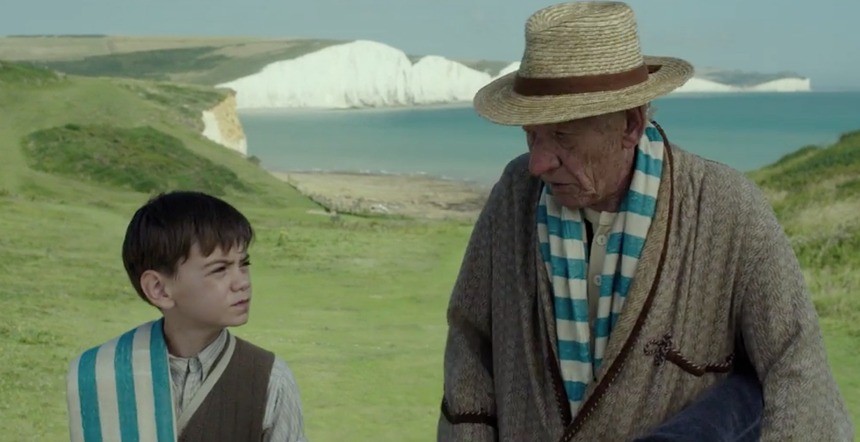These are the heartbreaking questions that Mr. Holmes explores. Detective Sherlock Holmes has long since departed Baker Street, is no longer accompanied by Dr. Watson, and is no longer a detective. Instead, the elderly Mr. Holmes spends his days tending to the bees at his country cottage, tormented by the forgotten details that led to his retirement. He knows that some private choice or failure must have motivated his decision to resign himself to a quiet country living, friendless and un-bothered, but ... what happened? He simply can't remember the truth of the situation, and every passing day he finds it more and more difficult to remember even the simple names of people, places, and events of his everyday life.
A truly sterling performance by Ian McKellen as the aged Mr. Holmes is simultaneously sympathetic and unsettling. His wit and genius are harder to discern through his sagging jaw. His once tireless powers of logic flicker weakly under his failing memory. Certainly Sherlock Holmes may have rather died at Reichenbach Falls as he once pretended, but Mr. Holmes instead travels the hobbling path of age, walking slowly and helplessly to his twilight years in an overwhelmingly ordinary way that Sherlock Holmes probably would have despised.
Yet for the dementia and senility that Mr. Holmes sometimes falls victim to, there remains a glimmer of the old sleuth, and his housekeeper's son Roger is determined to bring it out. The spunky young boy's inquisitiveness impresses Mr. Holmes, and the two develop a grandfather-grandson type relationship as the story evolves. Holmes teaches Roger about bees and wasps, and tricks of deduction and observation, while also recounting pieces of the story that eventually drove him to retirement. Piece by piece, the story comes together, and the memories that Mr. Holmes had blocked, connect, bringing long-needed closure.
Complementing Ian McKellen's spectrum of talent is Laura Linney in a stoic but effective role as Holmes' long-suffering housekeeper Mrs. Munroe. Mrs. Munroe is a plain and simple country woman, steady, but quietly desperate to escape being Mr. Holmes' caretaker as his age imposes growing limits. She is a stark contrast to her young son Roger, played with delightful enthusiasm by Milo Parker. Roger is fascinated by Mr. Holmes, and while respectful of the old man, he wants to learn everything he possibly can about the retired detective. This trio of personalities come together as an engaging core cast, while each bringing their own distinctive heart to the quietly paced story.
As is inevitable in a movie about aging, Holmes must contend with regrets. As he pieces together the disjointed memories regarding his final case, the movie raises a stirring question about the necessity of truth over the comfort of a falsehood. Had Holmes handled his final case differently, and perhaps cast a lie to ease someone's pain, the eventual outcome would probably have been quite different. Interestingly, Holmes determines that honesty is perhaps not always the best policy. Although it is too late for Holmes to change his final case, he decides to close one final issue by covering the truth to save a life.
SPOILER WARNING: NEXT TWO PARAGRAPHS ONLY. One of the strengths of the story as a whole is how it tackles two particularly difficult issues that are timelessly relevant, yet presents them in a way that is faithful and unique to the era and its cultural requirements. Holmes' final case regards a young wife suffering from the depression of having lost two pregnancies, and the further hurt of an unfeeling husband who can't understand her need to grieve her unborn children. The pain of miscarriage is one that women have known for thousands of years, and that despair is masterfully portrayed here by Hattie Morahan as Ann Kelmot. While the root issue is universal and timeless, the limits of medical and psychological understanding are unique to the era, particularly in how Mrs. Kelmot is rebuked for her need to mourn her lost pregnancies. Eventually, the harsh aloneness that Mrs. Kelmot finds herself in drives her to suicide, abruptly ending Holmes' career as a detective.
Elsewhere in the story, Holmes encounters a Japanese man, a Mr. Umezaki, who believes his father died honorably after having supposedly received advice from Holmes to stay in England to help with the war effort. Holmes knows that he never met or advised Umezaki's father. He knows that the truth is that the man abandoned his family out of cowardice, and contrived a story about having been advised by Holmes to remain in England, as a cover to save the family honor. Ultimately, Umezaki's father is just another father who walked out on his family, leaving them to wonder if he would ever come back. Once again, while his reasons may be more specific to the era, the basic issue of a father fleeing his family is relevant to every generation in some way or another. Having learned from his failure with Mrs. Kelmot, Holmes determines that in order to save Umezaki's honor (and possibly his life), he will allow Umezaki to believe a lie rather than contend with the shame of knowing his father was a coward and a deserter. END SPOILERS
Mr. Holmes is by no means an exciting movie, but is the sort of movie that is perfect for a snowy day next to the fire, when we as the audience are most receptive to tender stories about age, grief, regrets, and closure. It is difficult, at times, to watch as the famous detective is reduced to a forgetful and hobbling old man, but ultimately Mr. Holmes gives a satisfying finish that feels genuine, but also hopeful. In piecing together the events he had long suppressed, he brings himself closure and self-forgiveness, allowing the once extraordinary Sherlock Holmes to live out the remainder of his now-nondescript life in the sweet respite of peace.

No comments:
Post a Comment